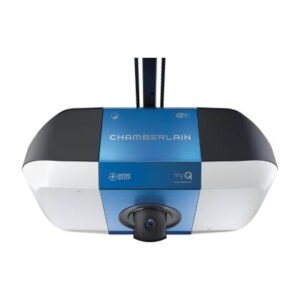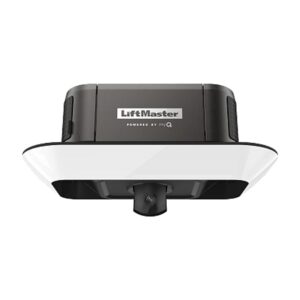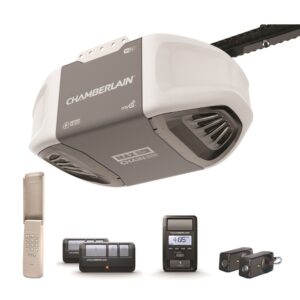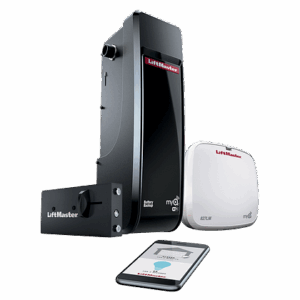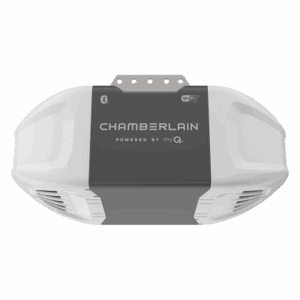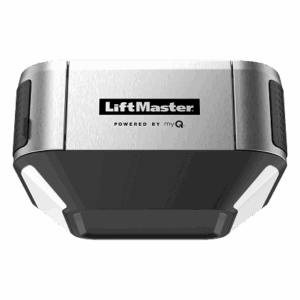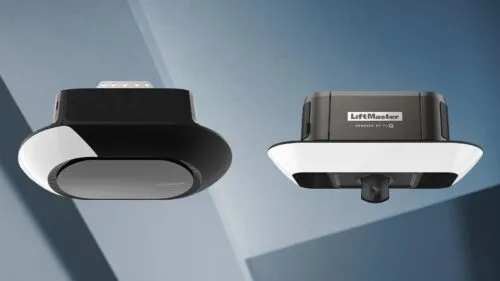
Thinking about getting a new garage door opener? It can feel like a big decision, right? You want something reliable, safe, and maybe even a little smart. Two names you’ll see pop up a lot are LiftMaster and Chamberlain.
These two are like siblings in the garage door world because they’re both owned by the same company, the Chamberlain Group. But even though they share a parent, they’re aimed at different people and different needs.
This isn’t just about picking a box off a shelf. It’s about finding a garage door opener that fits your life, your garage, and your budget. Do you need something super heavy-duty, or just a simple, reliable way to get in and out? Are you excited to tackle installation yourself, or would you rather have a pro handle everything?
This guide will walk you through the key differences between LiftMaster and Chamberlain garage door openers. By the end, you’ll have a clear idea of which brand and type of garage door opener is the best fit for your garage.
Understanding LiftMaster and Chamberlain
🧭 LiftMaster vs Chamberlain: At a Glance
| Feature | Chamberlain | LiftMaster |
|---|---|---|
|
Target Customer
Who is each brand primarily designed for?
|
DIY homeowners who want to install it themselves | Homeowners who want professional installation |
|
Where to Buy
Where can you purchase these openers?
|
Big-box retail stores (Home Depot, Lowe’s) & online (Amazon) | Dealer-exclusive; purchase through authorized professionals |
|
Installation
How are these typically installed?
|
Designed for easy self-installation with instructions & videos | Requires or strongly recommends professional installation |
|
Price Range (USD)
Typical cost range for standard models
|
$150–$400 for most models | $350–$900+ (often includes professional installation) |
|
Best For
Ideal use cases for each brand
|
Standard 7–8 ft garage doors; typical home use | Oversized/heavy doors; commercial/light industrial use |
|
Rail System
How the rail components are constructed
|
Multi-piece rail (easy to ship, may flex slightly) | Solid one-piece steel rail (stronger, more durable) |
|
Smart Features
Connected features and technology
|
MyQ app, Wi-Fi built-in, optional keypad/camera | Same MyQ tech, often includes camera, pro-level wall panels |
It’s helpful to know that both LiftMaster and Chamberlain are part of the same corporate family, the Chamberlain Group. Think of it like car brands under a big auto company. They share some core technology and a commitment to making reliable garage door openers.
However, they don’t aim for the exact same customer.
Chamberlain garage door openers are largely marketed directly to homeowners. You’ll spot them readily available at major retail stores. These are designed with the do-it-yourself (DIY) person in mind. They focus on being easy to install and user-friendly for typical residential garages, usually fitting doors up to 7 feet tall without needing extra parts.
LiftMaster, on the flip side, is the professional line offered by the Chamberlain Group. You typically won’t find LiftMaster garage door openers on the shelves at your local big box store. Instead, they are sold through authorized dealers and professional installers.
LiftMaster openers are built to handle tougher jobs. They’re suited for heavy-duty use, like larger or heavier garage doors, and even some light commercial settings. In fact, LiftMaster is known as the leading brand for professionally installed residential openers.
Here’s a quick way to look at their market positioning:
- Chamberlain: Great for the average homeowner who likes DIY projects. Easy to buy and install for standard residential garage doors.
- LiftMaster: Geared towards professional installation for homes needing more power or features, or in commercial spots that see a lot of use.
What about outside the United States? In North America, you’ll find both brands. Chamberlain is in retail, and LiftMaster is through dealers. Internationally, the Chamberlain Group often uses the LiftMaster name for products sold by professionals. You might see Chamberlain-branded openers for DIY folks in some European countries, or even different brand names entirely in places like Australia (like Merlin).
But generally, the core technology, like the MyQ smart system, stays the same worldwide. Just remember to check local availability, as models and features can differ by country.
Strengths and Weaknesses: LiftMaster vs Chamberlain Garage Door Openers
Both LiftMaster and Chamberlain make good garage door openers. They really do. But because they’re made for different buyers and uses, they have their own strong points and some areas where they aren’t the best fit. It’s like comparing a sturdy work boot to a comfortable running shoe – both are footwear, but for different jobs.
Let’s look at what makes each brand stand out, for better or worse.
LiftMaster – What’s Great and What’s Not
Strengths:
- Built Tough: LiftMaster openers are known for being heavy-duty. They use strong parts, often with a solid steel rail that’s all one piece. This makes them really durable.
- They’re great for big, heavy garage doors, like ones made of solid wood, or for garages with multiple doors. If you open and close your garage door a lot, LiftMaster is built to handle it.
- Lots of Features: LiftMaster offers advanced features. Many come with battery backups, so your door still works when the power goes out. Some even have cameras built right in so you can see your garage from your phone. They also have cool options like wall-mounted openers that save ceiling space.
- Lasts a Long Time: Because they’re made for professional installs, LiftMaster units tend to use stronger parts. They’re designed to hold up to frequent use and can last for many, many years. People often mention how smooth and consistent they are, especially newer models.
- Pro Help: When you buy a LiftMaster, a professional usually installs and services it. This means it’s set up correctly for the best performance and safety. If something goes wrong, the dealer handles the warranty work.
Weaknesses:
- Costs More: LiftMaster garage door openers generally have a higher price tag. Because they’re heavy-duty and often professionally installed, they cost more upfront than Chamberlain. Prices usually start higher and go up depending on the features.
- Needs a Pro to Install: LiftMaster isn’t really made for you to install yourself. You usually buy them through installers, not regular stores. The installation can be a bit more complicated. So, you’ll likely need to hire someone, which adds to the total cost.
- Not Always Easy to Find: Since you can’t just grab one at a retail store, getting a LiftMaster might take a bit more planning. You might need to schedule an installation. Getting replacement parts might also mean going through a dealer.
- Warranty Perception: Sometimes, LiftMaster’s written warranty periods on certain parts look shorter than Chamberlain’s. For example, parts might have a 1 to 3-year warranty, while Chamberlain might advertise longer. Even though the dealer handles service, the shorter length on paper can seem like a drawback.
Chamberlain – What’s Great and What’s Not
Strengths:
- Easy on the Wallet: Chamberlain garage door openers are generally more affordable. Most models with lots of features are priced lower than LiftMaster. You can often find good, reliable openers without spending a lot.
- Made for DIY: Chamberlain really designs its products so you can install them yourself. They come with clear guides and parts that are easy to handle. Many homeowners find installing a Chamberlain is simple with just basic tools. Plus, you can easily buy them at home improvement stores or online.
- Quiet Options: Chamberlain has many belt drive models that are super quiet. They use reinforced rubber belts and smooth DC motors to keep noise down. This is perfect if you have rooms above your garage.
- Smart and Modern: Chamberlain has been a leader in adding smartphone control (MyQ) to garage door openers. Most newer models have Wi-Fi built-in, letting you control and monitor your door with an app. They often include extras like wireless keypads too.
- Easy to Get Parts and Support: Since Chamberlain openers are popular, parts and accessories are easy to find. They use secure rolling code technology, just like LiftMaster, for safety. The warranties are often generous, giving you peace of mind.
Weaknesses:
- Not for Heavy Jobs: Chamberlain openers are made for standard residential garage doors. They have lighter parts than LiftMaster. For extra-large, heavy, or frequently used doors, a Chamberlain might wear out faster. They are not meant for commercial use.
- Rail Might Flex a Little: The rail that comes in pieces for easy DIY can flex slightly under the load of a very heavy door. While fine for normal doors, it’s not as rigid as LiftMaster’s one-piece rail.
- Support is DIY-focused: If there’s a problem, Chamberlain’s support is usually online or by phone. They might send you replacement parts, but they don’t send technicians to your house. You’ll need to fix it yourself or hire someone.
- Fewer High-End Integrations: While Chamberlain shares many features, some very premium options are less common. Things like wall-mounted openers aren’t as widely available, and certain advanced security add-ons might not be standard.
In short, LiftMaster is generally the more robust, professional-grade option, great for demanding use or when you want a pro installation. Chamberlain offers fantastic value and ease of installation for typical home garage door needs. Choosing between LiftMaster and Chamberlain often comes down to balancing your budget, your door’s needs, and whether you prefer DIY or professional service.
Key Features: Comparing Drive Systems, Motors, and Smart Tech
When you look at LiftMaster vs Chamberlain garage door openers, you’ll see they share a lot of technology. That’s because they’re from the same company, the Chamberlain Group. However, how that tech is used can differ between brands. Let’s break down some of the key features you’ll encounter.
Motor Types: AC vs. DC
Garage door openers use either AC or DC motors. This is a key difference in how they perform and sound.
Think of AC motors as the older, simpler type. They are strong and have been used for years. They deliver full power right away, which can make the door start and stop abruptly. This often leads to more noise and vibration. AC motors cannot run on battery power without an extra device, so openers with these motors typically don’t have battery backup.
DC motors are more modern. Both Chamberlain and LiftMaster use them often, especially in their belt drive and wall-mounted openers. DC motors allow for a soft start and stop. The door begins and ends its movement smoothly. This results in much quieter operation and less stress on the system over time. DC motors can also run on battery power, making battery backup a common feature on these models. While they might not use traditional “HP” ratings, top DC models offer plenty of power for residential garage doors.
Here’s a simple comparison:
- AC Motor: Strong, reliable, louder, jolting start/stop, no battery backup.
- DC Motor: Quieter, smoother start/stop, enables battery backup, more energy efficient.
Drive Systems: Belt vs. Chain (and More)
The drive system is what physically moves your garage door opener along the track. This is where you’ll see a big difference in noise and application between LiftMaster vs Chamberlain models.
The Chain Drive system is a classic. It uses a metal chain, similar to a bicycle chain, running along a rail. This system is known for its strength and durability. It’s often recommended for heavier garage doors because the chain is very strong and doesn’t stretch easily. Both LiftMaster and Chamberlain offer chain drive options.
- Pros: Durable, strong, often less expensive.
- Cons: Noisy (metal-on-metal sound), requires occasional lubrication.
The Belt Drive system uses a steel-reinforced rubber belt instead of a chain. This is the go-to if quiet operation is important to you. The belt glides along the rail, making it much quieter than a chain drive. This is especially good if you have rooms above your garage. Chamberlain is well known for its quiet belt drive models. LiftMaster also features belt drives in its premium line.
- Pros: Very quiet operation, smooth movement, less vibration.
- Cons: Typically more expensive than chain drives, belt might need tensioning or replacement over many years (though often covered by long warranties).
Beyond these two main types, there’s the Jackshaft (Wall-Mount) Direct Drive. LiftMaster pioneered this with models like the 8500W. These openers mount on the wall next to the garage door, directly turning the spring shaft.
- Benefits: Frees up ceiling space, extremely quiet (no long rail, chain, or belt), often includes an automatic door lock and battery backup.
- Considerations: Pricier, requires a torsion spring system on your door, and specific side clearance. Chamberlain has similar models (RJO series), but they are not as widely available.
So, for brute strength and lower cost, consider a chain drive. For quiet performance, a belt drive is the way to go. If saving ceiling space and ultimate quietness are key, and you have the right garage door setup, a wall-mount opener is worth exploring.
Smart Features and Connectivity
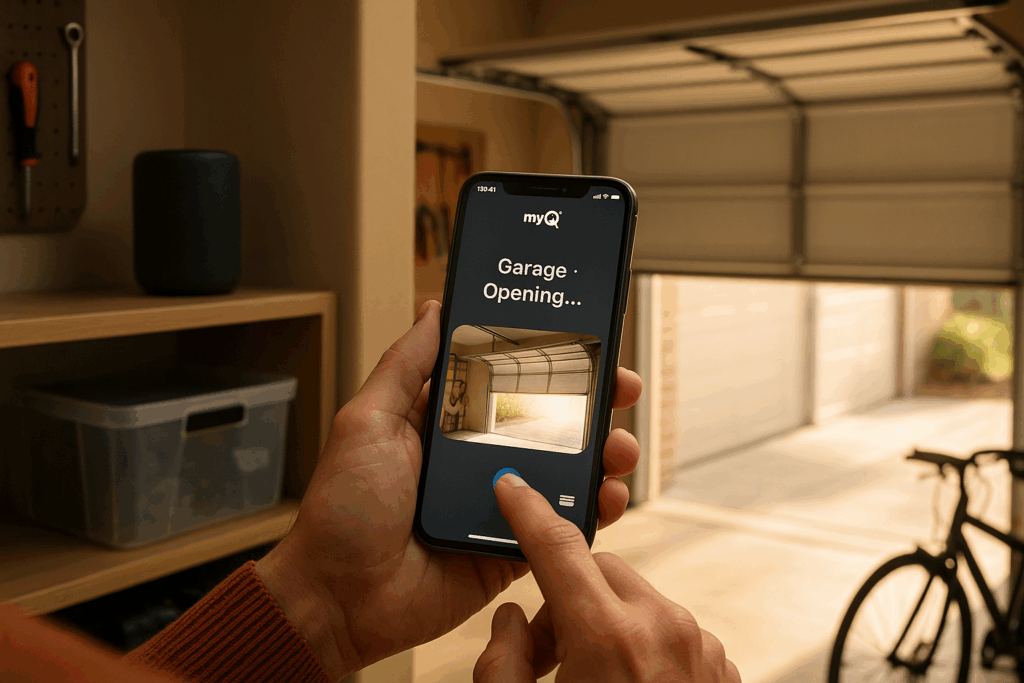
When it comes to smart features, LiftMaster and Chamberlain are very similar. They both use MyQ technology.
- Built-in Wi-Fi: Most newer models from both brands have Wi-Fi built in. This lets them connect to your home network.
- MyQ App: You use the same MyQ app for both LiftMaster and Chamberlain openers with Wi-Fi. The app lets you open/close the door, check if it’s open, get alerts, and set schedules from your phone.
- Smart Home Integration: MyQ works with many smart home systems like Google Assistant and Amazon Alexa. Some features might need a small fee or extra steps. Apple HomeKit is possible, but might need an add-on. Amazon Key works for in-garage deliveries. These integrations work for both brands equally.
- Security: Both brands use Security+ 2.0 rolling code technology for remotes. This creates a new code each time you open the door. It makes it very hard for someone to copy your remote code. This is a shared security feature. The MyQ app is also secured with encryption.
- Smart Accessories: Both offer accessories like smart cameras. LiftMaster might build the camera into some models, while Chamberlain might sell it separately. Chamberlain often includes a wireless keypad in the box, which LiftMaster usually doesn’t.
Overall, the smart experience is pretty much the same for LiftMaster and Chamberlain. There’s no big difference in app features or how they connect. Both offer convenient control and monitoring from anywhere.
Noise Levels
The amount of noise a garage door opener makes depends mostly on the motor and the drive system. Since LiftMaster and Chamberlain use similar parts, the noise level is more about the type of opener than the brand name.
| Opener Type | Noise Level | Best Use Case |
|---|---|---|
| Chain Drive (AC) |
Loud
|
Detached garages, where noise isn’t a concern |
| Chain Drive (DC) |
Moderate
|
Standard garages, budget-conscious buyers |
| Belt Drive (DC) |
Quiet
|
Attached garages, bedrooms nearby |
| Wall-Mount (Jackshaft) |
Ultra Quiet
|
High-end homes, ultimate quiet, ceiling space saved |
- Belt Drive is Quieter: Belt drive models are much quieter than chain drives. This is true for both brands. A belt drive from either Chamberlain or LiftMaster will be very quiet. You’ll likely hear the garage door itself more than the opener.
- Chain Drive is Louder: Chain drives will make a rattling noise. LiftMaster’s one-piece rail might make the chain noise slightly less noticeable than Chamberlain’s multi-piece rail, but the difference is small. Both are much louder than belt units. If noise is a concern, choose a belt drive or a wall-mount unit.
- DC Motor is Quieter: DC motors have a soft start and stop, avoiding loud clunks. AC motors have more mechanical noise. DC belt drive openers from either brand are extremely quiet. An AC chain drive from either will be louder.
- Wall-Mount Units are Quietest: These are often the quietest because the motor isn’t on the ceiling. LiftMaster’s wall-mount is very quiet. Chamberlain’s wall-mount units are also quiet.
- Noise Dampening: LiftMaster’s professional units might have extra parts to reduce vibration. Chamberlain’s premium belt drives have similar features. Proper installation and keeping your garage door well-maintained matter a lot for noise.
- Both brands have models called “Whisper” or “Ultra Quiet.” These use belt drives and DC motors for low noise.
- In practice, a quiet Chamberlain belt drive and a quiet LiftMaster belt drive will be very similar in noise.
Build Quality and Hardware Differences
This is an area where LiftMaster and Chamberlain show some clear differences, mostly because of who they are made for (pros vs. DIYers).
- Rail and Trolley: LiftMaster uses a single, solid steel rail for most openers. This rail is very strong. Chamberlain uses a rail that comes in sections that you connect. This makes the box smaller for retail. Chamberlain might use some reinforced plastic parts in the rail or trolley. These parts are strong for normal use but not as heavy-duty as LiftMaster’s all-metal parts. LiftMaster rails flex less and are better for very heavy doors.
- Materials and Weight: LiftMaster units are often a bit bigger and heavier. They use more metal in the main body. Chamberlain openers often have more plastic housings, which makes them lighter for DIY install. Inside, both use metal gears. LiftMaster might include stronger mounting hardware because a pro is installing it.
- Accessories & Sensors: Both come with standard safety sensors that stop the door if something is in the way. These sensors are often the same or can be swapped between brands. One difference is the wall control panel inside the garage. LiftMaster often includes a more advanced panel that might have a motion sensor to turn on lights automatically. Chamberlain usually has a simpler button or panel. However, Chamberlain often includes an outdoor keypad, which LiftMaster usually sells separately.
- Battery Backup: The battery units for backup are physically similar and often use the same parts.
- Reliability: Both brands are made by the same company, so their reliability is generally very good. They can last 10-15 years or more with good care. How well it’s installed and how you use your garage door affects how long the opener lasts. LiftMaster’s build might mean it handles heavy daily use better. Chamberlain is built for typical daily use at home.
- Security Locking: LiftMaster wall-mount openers and some premium models offer an automatic garage door lock. This is a separate lock that bolts the door shut for extra security. Chamberlain’s wall-mount models have this too. But Chamberlain’s regular overhead openers usually don’t have this automatic lock. Both brands have a feature (called PosiLock by LiftMaster) where the motor holds the door firmly when it’s closed.
To sum up build quality: LiftMaster uses heavier parts and a solid rail for extra toughness, especially for tough jobs. Chamberlain uses smart design with lighter materials where it makes sense to keep costs down and allow for DIY install. For normal home use, Chamberlain’s build is perfectly fine. For demanding use, LiftMaster’s stronger build offers more peace of mind. Both are built to last, but LiftMaster might hold up better under extreme or very frequent use.
Installation and Maintenance: Getting Your Opener Set Up and Running
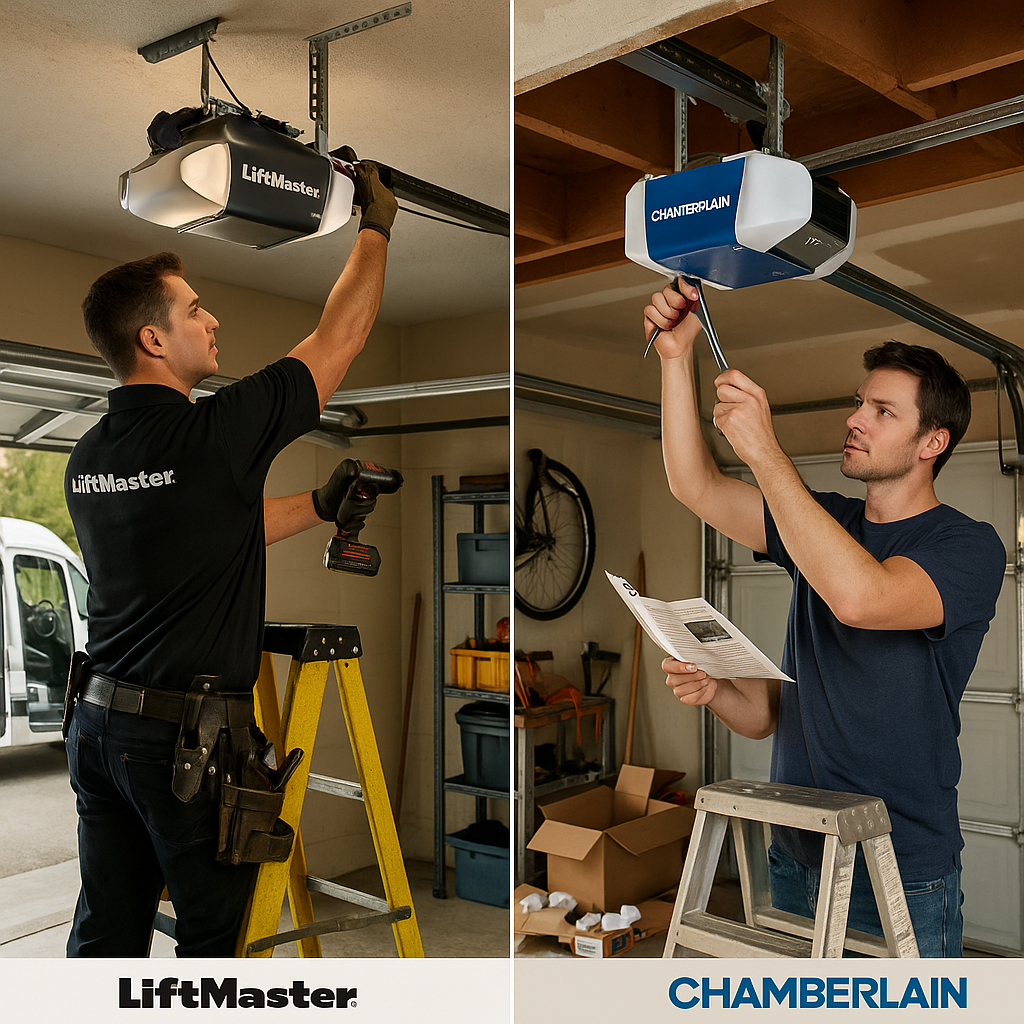
Setting up and taking care of your garage door opener are practical things to think about. The experience is quite different when you choose a Chamberlain vs LiftMaster.
Installation Complexity
- Chamberlain Installation:
- Chamberlain openers are made for you to install them yourself.
- They come with detailed instructions.
- You’ll find online videos and templates to help you.
- The rail pieces are a manageable size.
- The heaviest part is the motor unit, but one person can usually lift it.
- Wiring the safety sensors and wall control is simple.
- Chamberlain often uses color-coded parts or clamps that don’t need tools for wiring.
- Many people with basic tools can install a Chamberlain in a few hours.
- The kits usually include everything you need.
- Chamberlain tries to make installation as easy as possible for homeowners.
- LiftMaster Installation:
- LiftMaster openers expect a professional to do the job.
- The packaging might not be as detailed for a DIYer.
- Many are sent to dealers in bulk, not in retail boxes with step-by-step guides.
- The one-piece rail can be hard for one person to handle.
- LiftMaster models might have extra parts, like an automatic lock, that add steps to the installation.
- Professional installers are trained to put these in efficiently.
- If you try to install a LiftMaster yourself, you might find fewer pre-assembled parts.
- You might need to do more setup from scratch.
- LiftMaster suggests professional installation because of the extra features and size.
Simply put, Chamberlain is easier to install yourself. LiftMaster is designed for experts, though handy people can do it. If you want a pro to do the job perfectly, LiftMaster with a dealer is the way to go. If you like a weekend project and saving money, Chamberlain makes it possible.
Which Garage Door Opener Is Right For You?
- Professional installation includes all necessary tools
- Expert setup ensures optimal performance and safety
- Includes professional warranty service
- No DIY stress or complicated instructions
- Complete installation service by trained professionals
- Technicians handle all wiring and adjustments
- Professional warranty service if issues arise
- Peace of mind knowing it’s installed correctly
- Designed specifically for DIY installation
- Clear instructions and online support
- Lower cost without sacrificing quality
- Same smart features as professional models
- Stronger one-piece rail for heavy doors
- Professional installation ensures proper setup for large doors
- Higher horsepower options for extra weight
- Better suited for non-standard door configurations
Maintenance
Looking after your garage door opener is similar for both LiftMaster and Chamberlain. They use similar parts, so the basic care is the same.
Regular maintenance for your garage door opener includes:
- Lubrication: Chain drives on both brands need a little lubrication a few times a year. This keeps them running smoothly and quietly. Belt drives don’t need lube. Importantly, the moving parts of your garage door itself (rollers, hinges, springs) need to be lubricated, no matter what opener you have. A well-cared-for door puts less stress on the opener.
- Belt/Chain Tension: Chains can stretch a little over time, or belts might lose tension. Both Chamberlain and LiftMaster have ways to adjust the tension. Checking this once a year is a good idea for either brand. Chamberlain belt drives often have a spring that helps keep the belt tight automatically.
- Battery Replacement: If your opener has a battery backup, the battery usually lasts 2-5 years. You can get to it easily on both brands. Replacing it is simple: unplug the old one, plug in the new one. The batteries are often interchangeable between the two brands.
- Sensors and Alignment: The safety sensors need to be kept clean and aligned. Both brands have lights to show if they are aligned. If a sensor is bumped, you just need to put it back in line.
- Firmware/Connectivity: For smart openers, you might need to check the Wi-Fi connection or update the software sometimes. The MyQ app will usually tell you about updates.
- Service and Support:
- For Chamberlain, if something needs fixing under warranty, they’ll usually send you a part. You have to do the fix yourself or hire someone. Chamberlain has online guides and customer support.
- For LiftMaster, many people call their installer if there’s a problem. The dealer might come and fix it, especially if it’s under warranty.
Neither brand needs a lot of maintenance overall. They are built to last a long time with basic care. Chamberlain makes it simple for you to do the upkeep yourself. LiftMaster provides the option of professional service if you prefer not to do it. Keeping the garage door itself in good shape is key to a long life for either opener.
Warranty Coverage and Support
Thinking about what happens if your garage door opener breaks is important. Warranty is like a promise from the company. It shows how much they trust their product. Both LiftMaster and Chamberlain offer warranties, but they work a little differently.
Warranty Length
Generally, Chamberlain openers might show longer warranty times for some parts compared to LiftMaster. Chamberlain often talks about 5-year, 10-year, or even lifetime warranties on the motor and belt or chain. LiftMaster’s similar models might list warranties for 1, 3, or 5 years. For example, one source notes Chamberlain’s coverage is often between 1 and 5 years, while LiftMaster’s is between 1 and 3 years.
But these numbers don’t tell the whole story. Many Chamberlain openers have a “lifetime motor warranty,” meaning the motor is covered as long as you own your home. Some premium Chamberlain models also have a lifetime warranty on the belt or chain. The Chamberlain C870, a chain drive opener, has a lifetime warranty on the motor and chain, and 5 years on parts. A Chamberlain B550 has 10 years on the motor, 15 years on the belt, and 1 year on parts.
A LiftMaster 8550W, a belt drive with battery, might have had 5 years on the motor and 1 year on parts and battery. The exact times can change, but on paper, LiftMaster often seems to have shorter warranties.
Coverage Scope
Here’s a big difference in the LiftMaster vs Chamberlain comparison: how you get warranty service.
- Chamberlain (DIY): If a part is faulty under warranty, Chamberlain will usually send you the replacement part. You have to put it in yourself or pay someone to do it. Chamberlain does not send technicians to your home. The long warranty is good if you’re okay with doing the repair.
- LiftMaster (Pro): LiftMaster’s warranties might be shorter, but they often include labor if the installer does the service. Many LiftMaster dealers offer a 1-year labor warranty. So, if something goes wrong within that time, a pro will likely come fix it at no extra cost. The dealer can get reimbursed for parts by LiftMaster.
So, with Chamberlain, you might get parts for free later on, but you handle the fix. With LiftMaster, you might pay for parts sooner if it’s outside the warranty period, but a technician will likely do the work.
Support Channels
How you get help also differs.
- Chamberlain: They have customer support online and by phone for DIY users. You can often swap a faulty unit at the store where you bought it early on. After that, you might replace parts following Chamberlain’s instructions. Their website has guides for common fixes.
- LiftMaster: Customers usually call their installer or a LiftMaster dealer for support. You don’t typically call LiftMaster directly as a homeowner.
Component Warranties
It’s worth checking the specific parts covered. Motors often have the longest warranties because they rarely fail. Belts and chains can also have long warranties, sometimes lifetime on high-end Chamberlain models. Other parts like circuit boards or sensors usually have shorter terms, from 1 to 5 years. Accessories like remotes and keypads are usually covered for 1 year for both brands. Batteries typically have a 1-year warranty.
If you get a professional installation, the installer might guarantee their work for a certain time. This could cover things the DIY warranty doesn’t, like if the garage door needs adjustment, not just the opener being broken.
In simple terms, Chamberlain offers longer warranties on paper for the DIY person. LiftMaster offers a service-focused approach to warranty through its dealers. If you are comfortable doing minor repairs, Chamberlain’s warranty is great. If you want someone else to handle any issues, LiftMaster, through a dealer, gives you that peace of mind. Always check the specific model’s warranty details, as terms can vary. Sometimes, LiftMaster models also have lifetime motor warranties.
Warranty terms might also change in different countries. But the main idea of DIY vs. professional support stays similar.
Price Ranges and Value Tiers
Garage Door Opener Price Comparison
- Chain drive with 1/2 HP equivalent motor
- Wi-Fi/MyQ connectivity on most current models
- Ideal for standard 7ft garage doors
- Easy DIY installation with all hardware included
- Belt drive with 1/2 or 3/4 HP equivalent motor
- Significantly quieter operation than chain drive
- Built-in Wi-Fi and smartphone control
- Some models include battery backup
- Belt drive with 1-1/4 HP equivalent motor
- Ultra-quiet operation with DC motor
- Advanced features like built-in camera
- Battery backup standard
- Enhanced LED lighting systems
- Chain drive with 1/2 HP equivalent motor
- Wi-Fi/MyQ connectivity included
- Professional-grade components
- One-piece rigid rail system
- Belt drive with 3/4 HP equivalent DC motor
- Very quiet operation with soft start/stop
- Built-in Wi-Fi and motion-sensing wall control
- Battery backup standard
- Enhanced LED lighting system
- Belt drive or wall-mount jackshaft options
- Built-in camera with two-way audio (some models)
- Automatic garage door lock for enhanced security
- Battery backup standard
- Commercial-grade components for heavy doors
- Professional installation and setup
Let's talk about money. The cost is a big factor when you're choosing a new garage door opener. The price difference between LiftMaster and Chamberlain is pretty clear, and it's a key part of the LiftMaster vs Chamberlain decision.
Keep in mind that these prices are estimates in U.S. dollars and can change depending on where you buy. Also, LiftMaster prices often don't include installation, which adds to the total cost.
Chamberlain Price Range
Chamberlain openers are usually easier on your wallet. This makes them a popular choice for many homeowners. According to recent info, Chamberlain models generally cost between about $200 and $350 for most units. Some basic models can even be found for under $200.
Here's a rough idea of price tiers:
- Budget: You might find a basic chain-drive Chamberlain without Wi-Fi for around $150-$180. Many current budget models still have Wi-Fi, like the Chamberlain C240 (chain, Wi-Fi) or B2211 (belt, Wi-Fi). They often sell for around $200. These usually don't have battery backup and are best for standard doors.
- Mid-Range: In the $200-$300 range, you'll find Chamberlain's belt drive models with more features. The Chamberlain B550 (belt, 1/2 HP, Wi-Fi) is often about $248. The B750 (belt, 3/4 HP equivalent, Wi-Fi, battery backup) might be around $278. These offer a good mix of quiet operation, smart features, and sometimes battery backup for a fair price.
- Premium: The higher end of Chamberlain's line goes from $300 up to about $400. Models like the Chamberlain B970 (1-1/4 HP belt, Wi-Fi, battery) and the B6765 (with a camera and LED lighting) are in this group. The B6765 Secure View opener with a camera, battery, and LED lights has a suggested price around $399. Even the top Chamberlain models typically stay under $400, which is a great value for the features you get.
Value: Chamberlain's prices let many homeowners get a quiet, smart, and even battery-backed opener for under $300. If you install it yourself, you save on labor costs, making the total expense quite low for years of use.
LiftMaster Price Range
LiftMaster models cost more. This is because they are built to a professional standard and often include installation. LiftMaster openers generally start around $350 and can go up to $600 or more for high-end models.
Here’s a look at their pricing:
- Entry/Standard Tier: The least expensive LiftMaster might be the 8160W (1/2 HP DC chain drive with Wi-Fi) or 8365W (1/2 HP AC chain with Wi-Fi). These could cost $300-$400 just for the opener unit. With professional installation, the total cost might be around $400-$500 for these basic units.
- Mid-Range: Many people choose LiftMaster belt drive models with DC motors in the $400-$500 range for the unit. Models like the LiftMaster 84501 (1/2 HP DC belt, Wi-Fi, LED lighting) or 8550W/85503 (3/4 HP DC belt, Wi-Fi, battery backup) are examples. With installation, a mid-tier LiftMaster might cost around $600 total.
- Premium Tier: Top LiftMaster models, like the 87504 Belt Drive with camera and advanced lighting, or the 8500W Wall Mount jackshaft with battery, are more expensive. The opener unit itself can be $500-$600. The 8500W wall-mount often sells for around $550 for the unit. With professional installation, the cost for a wall-mount unit could be $700-$900.
Value: LiftMaster costs more upfront, but this often includes professional installation and service. You're paying for the convenience and knowing it's installed correctly. The hardware itself is also more expensive because of the heavy-duty build. The choice might be between paying around $300 and spending a weekend installing a Chamberlain yourself, versus paying around $600 to have a LiftMaster installed for you.
Cost of Ownership
Chamberlain openers are cheaper to buy initially. If one fails outside the warranty, replacing it is also less expensive. With LiftMaster, if something goes wrong years later, calling a dealer for repairs might cost a few hundred dollars for parts and labor. However, LiftMaster's stronger build might mean it lasts longer under tough use, potentially delaying the need for costly repairs, though both are generally long-lasting.
For your home's value, a LiftMaster might be seen as a premium feature in a high-end house. A Chamberlain is usually considered standard.
Promotions and Bundles
Sometimes, you can find deals. Local dealers might offer promotions on LiftMaster installations, especially if you're also buying a new garage door. Chamberlain units might go on sale at retail stores during holidays or be bundled with extra accessories at places like Costco.
In the end, Chamberlain is the more budget-friendly choice, offering smart, quiet openers for potentially half the cost of the LiftMaster route. LiftMaster is the premium option, with a higher price but the benefit of professional service and maybe a bit more durability for that cost. Think about the cost of your own time and if you need professional help when comparing prices.
Top Model Comparisons for Specific Use Cases
LiftMaster vs Chamberlain: Find Your Perfect Match
Compare top models from both brands based on your specific needs. Click on any use case to see detailed comparisons.
Quiet Operation
B2405 (Whisper Drive)
- 1/2 HP DC belt drive opener
- Steel-reinforced belt for smooth movement
- Soft start/stop technology
- Built-in Wi-Fi and MyQ
- Includes wireless keypad
84501 (Ultra-Quiet Belt)
- 1/2 HP DC belt drive
- Ultra-quiet performance
- Built-in Wi-Fi and MyQ
- Multi-function wall control with motion sensor
- Integrated LED lighting
Both models offer incredibly quiet operation with belt drives and DC motors that provide smooth start/stop functionality. Chamberlain offers a great value for DIY installation, while LiftMaster includes premium features like motion-sensing controls and better integrated lighting with professional installation.
Smart Home Features
B6765 (Secure View)
- 1.25 HP equivalent DC motor
- Built-in 1080p HD camera
- Built-in Wi-Fi and MyQ app control
- Battery backup included
- Includes outdoor keypad and two remotes
87504 (Secure View Elite)
- 3/4 HP equivalent DC motor
- 1080p HD camera with 2-way audio
- Built-in Wi-Fi and MyQ app control
- Battery backup included
- Advanced wall control with motion sensor
Both models offer cutting-edge smart features including built-in HD cameras and comprehensive MyQ app control. The Chamberlain B6765 provides excellent value for DIY installation, while the LiftMaster 87504 adds 2-way audio and is professionally installed for those wanting a hands-off approach.
Heavy-Duty Use
C870 (Chain Drive)
- 1.25 HP equivalent DC motor
- Rugged chain drive for heavy doors
- Wi-Fi and MyQ connectivity
- Battery backup included
- Lifetime warranty on motor and chain
8500W (Jackshaft)
- 24V DC motor (lifts up to 850 lbs)
- Wall-mounted design (direct drive)
- Wi-Fi/MyQ and battery backup
- Automatic garage door lock
- Extremely quiet operation
For heavy-duty applications, Chamberlain's C870 offers powerful chain drive performance at a budget-friendly price with DIY installation. LiftMaster's 8500W provides a premium wall-mounted solution with direct drive power, automatic door lock, and professional installation - ideal for heavy or tall doors, luxury homes, or light commercial use.
Budget Friendly
C240
- Chain drive with 1/2 HP equivalent
- Built-in Wi-Fi and MyQ
- Single remote included
- Standard lighting
- Easy DIY installation
8160W
- 1/2 HP DC chain drive
- Built-in Wi-Fi and MyQ
- Professional installation
- Multi-function wall control
- Dealer support and service
Both models offer reliable, basic operation with smart features at their respective price points. The Chamberlain C240 is significantly more affordable and designed for easy DIY installation. The LiftMaster 8160W costs more but includes professional installation and dealer support, making it "budget-friendly" within the professional installation category.
Space-Saving Design
RJO Series
- Wall-mounted jackshaft opener
- Frees up ceiling space
- Quiet operation (no overhead rail)
- MyQ connectivity
- Available for DIY installation
8500W
- Wall-mounted jackshaft design
- Frees up entire ceiling
- Extremely quiet direct drive
- Automatic garage door lock
- Battery backup and MyQ
Both wall-mounted openers free up valuable ceiling space, perfect for garages with storage needs or high ceilings. The Chamberlain RJO Series offers good value with DIY capability, while the LiftMaster 8500W adds automatic door locking, battery backup, and professional installation for a premium experience.
Sometimes the best way to understand the difference between LiftMaster vs Chamberlain is to look at specific models. Let's compare some top choices for common needs.
Best for Smart Homes: Chamberlain B6765 vs. LiftMaster 87504
If you're all about smart home tech, these two belt-drive openers are great choices. They're both super quiet and packed with smart features.
- Chamberlain B6765 (Secure View): This model has a 1.25 HP equivalent DC motor, good for lifting power. It's a belt drive, so it's very quiet. It has built-in Wi-Fi and uses the MyQ app for control. A standout feature is the built-in 1080p HD camera so you can see your garage on your phone. It also comes with battery backup. You typically get two remotes and an outdoor keypad. The price is around $399 retail, often found on sale for less, making it a high-value choice. The warranty is lifetime on the motor and belt, and 5 years on parts.
- LiftMaster 87504 (Secure View Elite): This one has a 3/4 HP equivalent DC motor. It's also a quiet belt drive. It has built-in Wi-Fi and uses the same MyQ app. It includes a 1080p HD camera with 2-way audio. Battery backup is included. It has bright, integrated LED lighting. LiftMaster often includes a more advanced wall control with a motion sensor. It's usually sold through dealers for about $500-$550 for the unit, with total installed costs often over $700. Warranty is lifetime on motor and belt, 5 years on parts.
Verdict for Smart Homes: Both are excellent for tech-savvy homes. The Chamberlain B6765 gives you amazing features for the price, perfect if you're comfortable with DIY. The LiftMaster 87504 is the pick if you want professional installation and service, or if you might integrate with more complex home automation systems. You get similar smart capabilities with either LiftMaster or Chamberlain in this comparison.
Best for Heavy-Duty / Commercial Use: Chamberlain C870 vs. LiftMaster 8500W
If you have a very heavy garage door or need something extra tough, these models offer more power.
- Chamberlain C870 (Chain Drive): This is Chamberlain's strongest chain drive opener with a 1.25 HP equivalent DC motor. It's built to lift heavy doors. It has Wi-Fi and MyQ and includes battery backup. It uses a rugged chain drive, which means it will be noisy. It's a ceiling-mounted opener. It's available at retail for around $300-$330, offering great power for the cost. Warranty is lifetime on motor and chain, 5 years on parts.
- LiftMaster 8500W (Jackshaft): This is a wall-mounted opener with a 24V DC motor that can lift doors up to 850 lbs and 14 feet high. It mounts beside the door, freeing up ceiling space. It's a direct drive system, so no chain or belt noise – it's very quiet. It includes Wi-Fi/MyQ, battery backup, and an automatic garage door lock for extra security. Professional installation is recommended. The unit costs about $550 via dealers, with installed costs often over $700. Warranty is lifetime on motor, 5 years on parts.
Verdict for Heavy-Duty: The Chamberlain C870 is a powerful, budget-friendly option for heavy residential doors if you don't mind chain noise and are comfortable with DIY or hiring a local handyman. The LiftMaster 8500W is a premium, quiet, space-saving professional solution ideal for heavy or tall doors, luxury homes, or light commercial use where professional installation and extra security features are valued.
Best for Quiet Operation: Chamberlain B2405 vs. LiftMaster 84501
For many, quiet operation is the most important thing, especially with an attached garage.
- Chamberlain B2405 (Whisper Drive): This is a 1/2 HP DC belt drive opener, known for being very quiet. It uses a steel-reinforced belt and DC motor for smooth, quiet movement. It has built-in Wi-Fi and MyQ. It typically includes two remotes and a wireless outdoor keypad. It uses standard light bulbs. Price is very affordable, around $220-$250 retail. Warranty is typically 10 years on motor, 15 years on belt, 1 year on parts.
- LiftMaster 84501 (Ultra-Quiet Belt): This is also a 1/2 HP DC belt drive, designed for ultra-quiet performance. It has built-in Wi-Fi and MyQ. It includes a multi-function wall control with a motion sensor. It features integrated LED lighting. It's usually sold through professional installers. The unit might cost $350-$400, with installed costs around $500. Warranty is likely 4-5 years on motor/parts.
Verdict for Quiet Operation: Both models offer incredibly quiet operation. The Chamberlain B2405 is an excellent value for a quiet, smart opener if you prefer DIY installation. The LiftMaster 84501 offers similar quietness through the professional channel, with some nice extras like better lighting and a motion-sensing wall control. Choosing between the LiftMaster vs Chamberlain belt drive openers depends on your budget and installation preference.
Summary & Choosing Between LiftMaster and Chamberlain
We've looked at a lot of details about LiftMaster vs Chamberlain garage door openers. Since they come from the same company, they have a lot in common. But their differences are important when you're deciding which one is best for your garage.
It really boils down to who each brand is made for and what you need.
Choose Chamberlain if:
- You like doing projects yourself.
- You want the best value for your money.
- Chamberlain openers cost less but offer great features like quiet belt drives and Wi-Fi.
- Installation is designed to be easy for homeowners. This saves you money on hiring someone.
- Your garage door is a standard size (like 7-8 feet tall) and used a few times a day.
- You still get modern features like MyQ smart control and good reliability.
- A Chamberlain belt drive opener will quietly work a two-car garage door and likely has a long warranty on the motor and belt.
- If your door isn't unusually large or heavy and you want a quiet, smart opener that's affordable, Chamberlain is a top choice.
- If you like having things like an outdoor keypad included or being able to find accessories easily at a local store, Chamberlain is a good fit.
Choose LiftMaster if:
- You prefer to have a professional install your opener.
- Your garage door is very heavy or oversized. LiftMaster's stronger build and one-piece rail offer extra confidence here.
- Your garage is part of a higher-end home setup, like a large garage with custom doors. LiftMaster's toughness and dealer support are a good match.
- You want a wall-mounted opener to free up ceiling space. LiftMaster is the main brand for this.
- You simply want the job done by an expert who will handle everything, including potentially covering labor under warranty.
- The opener is for a commercial place or a shared garage that gets used a lot throughout the day. LiftMaster has models specifically for heavy commercial use that Chamberlain doesn't.
Performance: For everyday home use, both brands offer reliable and smooth operation. Your garage door will open in about the same time with either a LiftMaster or Chamberlain. Safety features like auto-reverse sensors are standard on both. You can program remotes to work with your car (HomeLink). Performance differences show up with very heavy doors or constant use, where LiftMaster's professional features might have an edge.
Noise: If keeping noise down is key, look at belt drive DC models from either brand. Chamberlain has many quiet models, and LiftMaster's belt drives are just as quiet. The type of opener (belt vs. chain, DC vs. AC) matters more for noise than the brand itself. Wall-mounted LiftMaster openers are often the quietest option available. But a Chamberlain belt opener provides a very quiet experience for much less money.
Smart Features: The smart features with MyQ are basically the same for both LiftMaster and Chamberlain. You can control multiple garage doors from either brand using the same MyQ app. So, smart capabilities won't be a major deciding factor between the two.
Warranty & Support: Think about how you prefer to deal with problems. Chamberlain's longer warranties might mean free replacement parts down the road, but you'll need to do the repair yourself or hire someone. LiftMaster's warranty might be shorter, but a technician will likely come to fix it if it's covered. If you're not handy or don't want to deal with repairs, LiftMaster, through a dealer, offers more hands-off support. If you're comfortable with DIY fixes, Chamberlain's warranty is appealing.
Commercial Use: For commercial buildings or industrial needs, Chamberlain is not the right choice. You would go with LiftMaster or another brand made for that kind of heavy use. LiftMaster has special models for these situations that Chamberlain doesn't offer.
International: Outside the U.S., availability might guide your decision. In Canada, it's similar to the U.S. In Europe, you might find both, sometimes with different model names or frequencies. LiftMaster's professional units are often sold globally.
Many professionals agree that both brands offer high quality. The best choice depends on your installation plans and how you'll use the opener. If you have a typical home garage and enjoy DIY, Chamberlain offers satisfaction and savings. If you need a more demanding setup or want professional service, LiftMaster is worth the extra cost.
Think of Chamberlain like a popular car you maintain yourself, and LiftMaster like a vehicle that comes with a service plan. Both will work well, but the buying and ownership experience is different.
Ultimately, both LiftMaster and Chamberlain garage door openers are known for being reliable and innovative. Consider your specific needs – door size, features you want, budget, and if you want to install it yourself or hire a pro. Use this information to pick the brand and model that's the best fit for your home or business.
Conclusion: Liftmaster vs Chamberlain - Which Garage Door Opener is Right for You?
So, when you're faced with the decision between LiftMaster vs Chamberlain for your garage door opener, remember that they are both strong brands from the same company. Neither one is truly "better" in every single way. The right choice really depends on your specific needs and what matters most to you.
If you're a homeowner who likes to handle things yourself, wants great features without a huge cost, and has a standard residential garage door, a Chamberlain opener is likely a perfect fit. You get modern technology, quiet options, and a project you can complete yourself.
On the other hand, if you have a very heavy or unusually large garage door, prefer to have a professional handle the installation and any future service, or need features for a light commercial setting, LiftMaster is probably the way to go. You pay more for a professional-grade system and support.
Think about these questions:
- What size and weight is your garage door?
- How often do you use your garage door?
- Do you want to install it yourself or hire a pro?
- Is quiet operation a major concern because of living spaces nearby?
- How important are the latest smart home features to you?
- What is your budget?
By considering these points and looking back at the comparisons, you can confidently choose the LiftMaster or Chamberlain garage door opener that best meets your needs. Either way, you're getting a reliable opener that will serve your garage for years to come.

